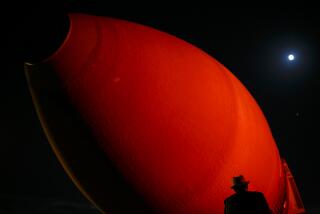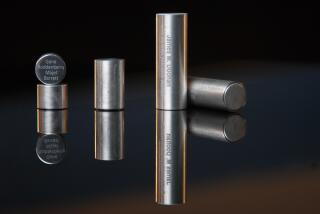Rocket Science
- Share via
SEAL BEACH — Students at McGaugh Elementary School will turn a $1.49 package of orange California poppy seeds into a science experiment next week when the space shuttle Columbia carries their payload on a 16-day mission.
The school, the first in Orange County to fly an experiment on the space shuttle and one of only a few elementary schools ever to undertake such an endeavor, was selected for the Friday mission by Instrumentation Technology Associates. The Exeter, Pa.-based company sells space on the shuttle to a number of institutions but also sponsors dozens of experiments submitted by high school, college or graduate students worldwide.
McGaugh fifth-grade teacher Jill Robinson and fourth-grade teacher Renate Mircheff designed an experiment small enough to fit in a shuttle chamber no bigger than the tip of their fingers and simple enough for their 9- and 10-year-old students to understand.
McGaugh’s experiment is not ground-breaking science, but it will be a fun exercise for the children. The experiment centers on the question of what will happen to the sample of seeds, and the flowers grown from them, after spending more than two weeks in zero gravity.
After returning from space, the seeds will be kept in storage until spring, when they will be planted along with conventional seeds that will serve as a control group. The plants grown from both sets of seeds will be compared.
“This is thrilling,” Mircheff said. “I dreamed of being an astronaut when I was a kid--and it helps the children become involved in actual scientific exploration.”
As they orbit the Earth, McGaugh’s seeds will be stored in a vial deep inside the shuttle’s payload, said Rick Knoll, director of business development for Instrumentation Technology Associates. The private company has a contract with the National Aeronautics and Space Administration to sell space on shuttle flights to the scientific community through 2001.
Neither NASA nor the astronauts will be involved in the research; the experiments will be loaded and unloaded by ITA.
The company launched its Student Space Experimentation Program five years ago as part of its philosophy to bring space exploration and science to the private sector. It donates a fraction of its space to recommended schools, Knoll said. McGaugh’s experiment was recommended by Rep. Dana Rohrabacher (R-Huntington Beach) through the House Subcommittee on Space and Aeronautics, which helps screen applications, Knoll said.
John Emond, a program manager with NASA’s space processing division, praised the school’s experiment, saying even rudimentary science can foster excitement in “the use of space at a very young age.”
Though the McGaugh experiment may seem simple in comparison to the high-tech research normally found on the shuttle, to the children in Mircheff and Robinson’s classes, this is rocket science.
Ten-year-old Joe Rokicki isn’t sure, but he suspects that the space flowers might ultimately become purple instead of orange. “They might be purple because space is different from Earth,” he said.
Dan Finlayson, 10, thinks that the weightless environment might affect the physical growth of the flowers. “I think it might affect the form of it--they might look different from the original ones. They might droop over,” he said.
Chad Huff, 11, has graver concerns. He worries that the seeds might just die from the lack of oxygen in space.
Also aboard the mission, which originally was scheduled to launch today, are nearly 900 science experiments paid for by private research and technology companies. Knoll estimated that a private company would be charged about $10,000 for the tiny compartment McGaugh’s seeds will occupy on the shuttle.
In contrast to the simplicity of the poppy seeds experiment, the next shuttle will carry materials related to more complicated research involving Urokinase Protein crystals and sealants that could eventually be used to protect national monuments from acid rain.
Still, Knoll said he believes McGaugh’s experiment could lend valuable information to scientists developing methods of growing fresh food in space.
More to Read
Sign up for Essential California
The most important California stories and recommendations in your inbox every morning.
You may occasionally receive promotional content from the Los Angeles Times.










